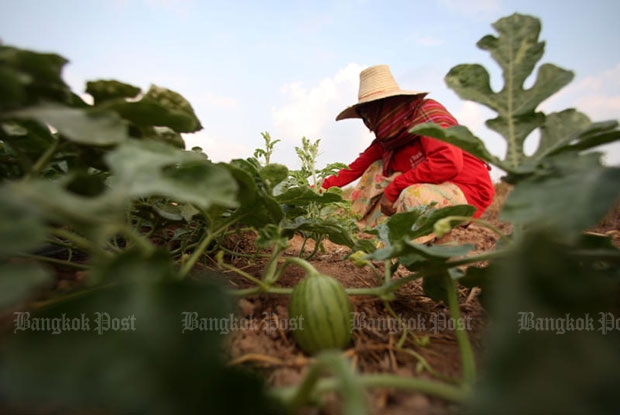
Cabbages and watermelons, often regarded as pesticide-contaminated, turn out to be safe to eat, while more than half of the vegetables and fruits awarded the government’s "Q mark" for quality were found to have harmful residue levels, according to a recent food safety survey.
The results were announced by the Thai-Pesticide Alert Network (Thai-PAN), which tested 138 samples of popular fruits and vegetables in Greater Bangkok, Chiang Mai and Ubon Ratchathani during March 16-18.
- Commentary: Organic, in Thai, means 'unsafe'
The network sent the samples for testing at a lab in the United Kingdom. Laboratory workers used a multi-residue pesticide screen method to examine for 450 residues.
Prokchol Ousup, a Thai-PAN coordinator, said the overall results showed that 46.6% of samples contained residues higher than the accepted safety standard level. Notably, 57.1% of fruits and vegetables granted the “Q mark” by the National Bureau of Agricultural Commodity and Food Standards, were to be found contaminated at unsafe levels.
She said 25% of the products certified as being organic, which were supposed to be free of chemicals, were found to contain chemical residues exceeding the accepted standards.
The network said that fruits and vegetables collected from modern trade outlets where consumers pay higher prices did not have much higher safety standards than those in wet markets, with 46% of produce from modern trade shops containing residues exceeding the standards, compared with 48% from fresh markets.
Ms Prokchol said residues of 11 prohibited substances were found in the samples.
In breakdown, 100% of red chilli had harmful residues exceeding the standards, followed by basil and long beans (66.7%), Chinese kale (55.6%), Chinese cabbages (33.3%), morning glory (22.2%), tomatoes and cucumbers 11.1%.
However, 100% of the cabbage samples were free from harmful residues.
For the fruits, 100% of tested oranges and guava were contaminated with harmful residues exceeding the standards. Dragon fruit, papayas and nam dokmai mangoes also found to have residues at 71.4%, 66.7% and 44.4% respectively.
Watermelon was free of harmful residues, in line with previous test results done by Mahidol University in 2014.
The network has already presented its test results to modern trade chainstores, the Thai Fresh Market Association, and related government agencies.
Kingkorn Narintarakul, deputy director of BioThai, a foundation that promotes sustainable agriculture and food security in various communities across the country, said the Agricultural and Cooperatives Ministry needs to revamp its operation to ensure credibility in granting its "Q mark" of safety to farmers.
Ms Kingkorn noted that the tests this year had been widen to cover more substances. If the test results had been cut to only four main groups, as in 2012, the unsafe percentage of chemical residues would be found in only 18% of tested samples, compared with 48.6% in 2012.

A farmer in Nakhon Ratchsima harvests cabbages in January 2016. (Bangkok Post file photo)